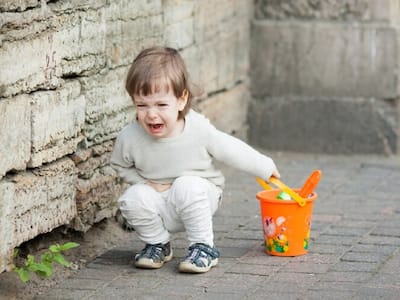
Behavioral issues like tantrums and meltdowns are common during the toddler years. Here’s how parents should respond to toddler meltdowns.
Taking care of a toddler can be challenging and exhausting as they are always on the go and need to be so closely monitored. Also, behavioral issues like throwing tantrums, meltdowns, hitting, biting, kicking, screaming, and whining are common during toddlerhood. What causes meltdowns in toddlers and what parents can do about their children’s emotional outbursts?
Dr Vrushali Bichkar, Consultant Paediatrician and Neonatologist, Motherhood Hospital, Lullanagar, Pune, says, “Toddler meltdowns can be challenging for both parents and children. These emotional outbursts are a common occurrence during the toddler years, as children are still learning to regulate their emotions and communicate effectively. It is crucial for parents to respond calmly and empathetically to these meltdowns, not only for the child’s emotional well-being but also from a health perspective.”
The paediatrician explains the reasons behind toddler meltdowns and why a calm parental response is important.
Understanding Toddler Meltdowns
Toddler meltdowns are typically triggered by factors such as frustration, exhaustion, hunger, overstimulation, or an inability to express their needs adequately. During these episodes, toddlers may exhibit behaviors like crying, screaming, kicking, or even physical aggression. It is important to remember that meltdowns are a normal part of a child’s development and should not be confused with deliberate misbehaviour or disobedience.
The Impact of Calm Parental Response on Health
According to Dr Bichkar, it is important that parents respond calmly to toddler meltdowns to promote healthy development. A calm parental response is essential for:
Emotional Regulation
A calm parental response plays a pivotal role in helping toddlers learn to regulate their emotions effectively. When parents respond calmly to meltdowns, it helps the child feel secure and reassured. This can prevent excessive stress and anxiety, which have been linked to adverse health outcomes in children, including sleep disturbances, weakened immune system, and behavioural problems.
Stress Hormone Regulation
When a child experiences a meltdown, stress hormones such as cortisol are released in their body. A calm and nurturing parental response can help regulate these stress hormone levels, promoting a healthy stress response and preventing long-term physiological effects associated with chronic stress.
Brain Development
The early years of a child’s life are crucial for brain development. Excessive stress and negative emotional experiences during meltdowns can impact the developing brain. On the other hand, a calm parental response helps create a positive emotional environment, supporting healthy brain development and the formation of neural connections necessary for emotional regulation and cognitive functions.
Sleep Quality
Toddlers who experience frequent meltdowns may struggle with sleep disturbances, which can have a significant impact on their overall health. A calm parental response during meltdowns can help alleviate emotional distress and promote better sleep quality in children, leading to improved physical and cognitive development.
Social and Emotional Well-being
Toddlers who receive calm and supportive responses from their parents during meltdowns develop better social and emotional skills. They learn to trust their caregivers, develop secure attachments, and have healthier relationships with others. This positive social-emotional development lays the foundation for mental well-being in later life.
READ RELATED: 5 Best Strength Exercises for Women To Banish Back Fat
Tips for Calmly Responding to Toddler Meltdowns
Dr Bichkar shares tips for parents on how to respond to toddler meltdowns:
Stay Calm and Patient
Remain composed and patient during your child’s meltdown. Take deep breaths and remind yourself that your calm response is crucial for their well-being.
Empathize and Validate
Recognise your child’s feelings and reassure them that it’s alright to be angry or frustrated. Say things that show you’re sympathetic, such as “I understand you’re feeling overwhelmed” or “It’s okay to be angry, but let’s find a solution together.”
Provide a Safe Space
Create a safe and quiet environment for your child to calm down. Remove any potential hazards and offer a cozy spot where they can feel secure.
Use Distraction and Redirection
Redirect your child’s attention to a different activity or engage them in a favorite game or toy to help divert their focus from the meltdown.
Teach Healthy Coping Mechanisms
As your child grows, encourage them to express their emotions in a healthy manner. Teach them simple relaxation techniques like deep breathing or provide them with age-appropriate coping strategies, such as using a stress ball or engaging in creative outlets like drawing or storytelling.
Final word
Responding calmly to toddler meltdowns is crucial for promoting optimal health and well-being in children. By providing a calm and empathetic response, parents can support their child’s emotional regulation, reduce stress levels, and foster healthy brain development. Remember that a calm parental response during meltdowns not only benefits the child’s immediate well-being but also lays the foundation for their long-term health and emotional resilience.
Total Wellness is now just a click away.
Follow us on
Don’t Miss Out on the Latest Updates.
Subscribe to Our Newsletter Today!
window.addEventListener(‘load’, (event) => {
$(‘#commentbtn’).on(“click”,function(){
(function(d, s, id) { var js, fjs = d.getElementsByTagName(s)[0]; if (d.getElementById(id)) return; js = d.createElement(s); js.id = id; js.src = “//connect.facebook.net/en_US/sdk.js#xfbml=1&version=v2.3”; fjs.parentNode.insertBefore(js, fjs);}(document, ‘script’, ‘facebook-jssdk’));
$(“.cmntbox”).toggle();
});
});









